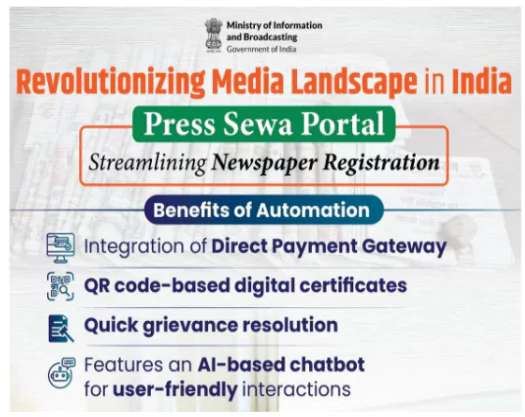![]() 4 Mar 2024
4 Mar 2024
English
हिन्दी

The Indian government has officially announced the implementation of the significant Press and Registration of Periodicals Act (PRP Act), 2023 and its Rules.
Features of Press Sewa Portal :
|
|---|
| Benefits of PRP Act | Drawbacks of PRP Act |
|
|
| Aspect | Press and Registration of Books Act, 1867 | Press and Registration of Periodicals Act, 2023 |
| Scope | Includes books and periodicals | Focuses only on periodicals |
| Declaration by printing press | Required before District Magistrate | Online intimation to Press Registrar General and District Magistrate |
| Declaration by publisher | Required before District authority | Not required, application for title and registration made simultaneously |
| Penalties | Severe penalties including imprisonment | Decriminalized, except for extreme cases of non-compliance |
| Cancellation of registration | Only by District Magistrate | Press Registrar General has power to suspend/cancel |
Significance
News Source: AIR
| Must Read | |
| NCERT Notes For UPSC | UPSC Daily Current Affairs |
| UPSC Blogs | UPSC Daily Editorials |
| Daily Current Affairs Quiz | Daily Main Answer Writing |
| UPSC Mains Previous Year Papers | UPSC Test Series 2024 |
<div class="new-fform">
</div>